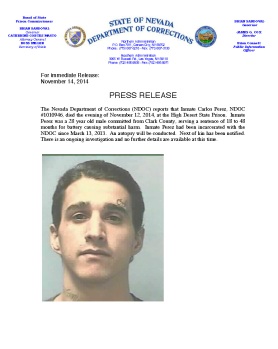Sorry, that’s not fair.
The Nevada Department of Corrections did, in fact, provide an entire paragraph to the press on inmate Carlos Perez in November.
Name. Age. Number. The fact that he was dead.
 The news release ends with this statement: “There is an ongoing investigation and no further details are available at this time.”
The news release ends with this statement: “There is an ongoing investigation and no further details are available at this time.”
That, of course, was a lie.
Sorry, that’s not fair.
Perhaps it wasn’t a lie. Perhaps it was simply a poorly worded way of saying ‘We’re not going to release any more information at this time.’
Either way, what the DOC didn’t tell the public at the time is how Perez died — shot multiple times while handcuffed behind his back. Or that another inmate, also handcuffed, had been shot.
It’s incidental stuff like that the DOC wants to keep from the public — by statute — in a bill (SB57) proposed before the Nevada Legislature.
The Department of Corrections already is fairly stingy with the information it releases to the media (see its policy, Administrative Regulation 120), and we testified against the bill by pointing out how vague is the language.
More significantly, it would reverse the Legislature’s fundamental stance on public records as stated in NRS239 — that all public records are open to the public unless otherwise declared to be confidential.
The DOC bill, instead, would make all records pertaining to prisoners confidential unless they are declared open by prison officials.
The reason? Well, the testimony from prison officials essentially was that they get too many requests for records. They pointed out that one of their inmates, OJ Simpson, tends to get a lot of attention.
They also noted there are security concerns when one prisoner tries to gain access to information about another prisoner.
Our suggestion: Follow the standard of Nevada’s records law and specify the information that needs to be kept confidential for security reasons. Put that, and only that, in law.
And one more thing: When a couple of prisoners are shot by a guard, mention that in the press release.
 Nevada Press Association The best in Nevada journalism since 1924
Nevada Press Association The best in Nevada journalism since 1924